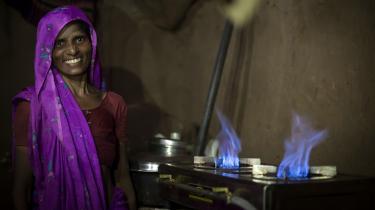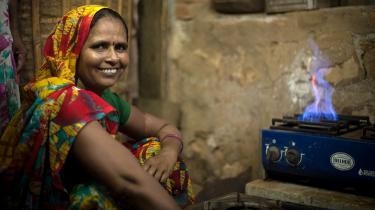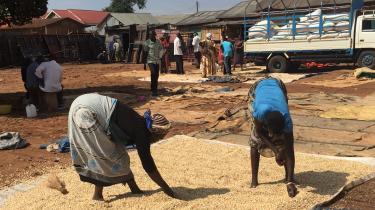How can the benefits of renewable biogas be harnessed to help deliver the Sustainable Development Goals (SDGs) to end poverty, protect the planet and improve lives? This was the question posed by the Shell Foundation, which has been supporting the use of biogas digesters by smallholder farmers in low income countries around the world. To answer this question, a Triple Line team developed theories of change to map the impact of biodigesters on SDGs 2 (Zero Hunger), 7 (Affordable and Clean Energy) and 13 (Climate Action), and used these to assess the extent to which the application of biodigesters does, in fact, contribute to the SDGs across different contexts, geographies and markets.
Biogas is an environmentally friendly renewable fuel produced by the breakdown of organic waste. Biodigesters facilitate this process and capture the methane produced by the anaerobic digestion of waste. This versatile fuel can be used for cooking, heating, lighting, power generation, as well as in transport applications; and the bio-slurry produced as a by-product is an effective organic fertiliser which has a significant positive impact on yields and on long-term soil health.
Biodigestors can be used by both low-income smallholder farmers as well as larger commercial farms. The smallest systems only require waste from two cows, which is sufficient to generate enough biogas for household cooking, and enough bio-slurry to fertilize a small plot of land. In Africa alone, estimates suggest that 33 million smallholder farming households have the right conditions to adopt biodigesters – but the number of installed and operational biodigestors is less than one per cent of that.
In Africa alone, 33 million smallholder farming households have the right conditions to adopt biodigesters, but the number of installed and operational bio-digestors is less than one per cent of that
In order to better understand how biodigesters can help improve the lives and livelihoods of smallholder farmers in low income countries, Shell Foundation (SF), a UK-registered charity that supports enterprises delivering energy access solutions in Africa and Asia, commissioned this piece of research to test the hypothesis that biodigesters can contribute significantly to progress towards the SDGs, specifically:
- SDG 2: Zero Hunger
- SDG 7: Affordable and Clean Energy
- SDG 13: Climate Action
The scope of this assignment was global, as Shell Foundation were also interested in exploring how impact varied in different geographic contexts and by different market segments. Finally, given the impact of the technology, Shell Foundation also wanted the research team to explore different routes to scale.
Our research team started off by taking a theory of change approach to assessing impact. Drawing on a literature review and a workshop with the Shell Foundation and its partner Sistema.bio, a social enterprise which manufactures, markets, and sells bio-digesters to low-income farming communities in Central America, East Africa, and South Asia, we developed a theory for change for the impact of biodigesters on SDGs 2, 7, and 13. These theories of change became the overarching structure for our assignment.
Our team, which combined expertise in renewable energy, smallholder agriculture, and impact-based financing, then focused on assessing the strength of evidence behind each theory of change. This drew on a wide-ranging review of academic and grey literature, as well as analysis of internal customer data provided by Sistema.bio and interviews with key stakeholders in the sector. This data collection and analysis identified where there is clear empirical proof for impact and where there are still outstanding data gaps.
Our research demonstrated that biodigesters contribute significantly towards SDG 2, Zero Hunger, through the use of bio-slurry as fertiliser. Bio-slurry is an effective natural and organic fertiliser, which has a major impact on smallholder farmer productivity and the nutritional quality of agricultural crops. Bio-slurry also improves soil health and contributes to the development of more sustainable and resilient agricultural systems, which again has a strong relationship with ensuring food security in rural communities.
There was also clear evidence for the impact of biodigesters on SDG 7, Affordable and Clean Energy. Worldwide, more than three billion people still rely on wood, charcoal and fuel for cooking. These fuel sources are non-sustainable and inefficient. The biogas produced by biodigesters is an efficient and clean fuel, which does not emit harmful particles into the air. After the initial purchase of the biodigester, the biogas generated is also free. This can bring significant cost savings for poor smallholder farmers; the average Sistema.bio customer was spending more than US$300 a year on energy before buying a biodigester.
We also found a robust link between biogas and SDG 13. Combustion of biogas captured via a biodigester converts methane that otherwise would be released directly into the atmosphere into carbon dioxide. Given that methane is a much more powerful greenhouse gas, the net effect of this process is beneficial to the environment. Furthermore, the use of biogas in cooking typically displaces other, non-sustainable energy sources, including biomass, kerosene, and liquified petroleum gas (LPG). These energy sources all are contributors to greenhouse gas emissions. Widespread adoption of biogas may also lead to reduced deforestation.
Finally, we identified several different scaling mechanisms which could be easily adapted for the biodigester industry. These include innovative finance solutions, such as crowd-based lending, off-balance sheet securitisation, and carbon offset schemes.
The assignment demonstrated that biogas is a powerful tool to increase smallholder farmer productivity and mitigate climate change, across a range of different contexts, geographies and market segments. There is clear potential for strong development impact but, while there is a clear sustainable business model for biogas, it is capital intensive, and reaching the poorest consumers at scale is challenging without some form of subsidy.
Link to report here: Analyses of biogas' contribution towards the Sustainable Development Goals: Zero Hunger, Affordable and Clean Energy, and Climate Action.
Credit: title photos by Shell Foundation



